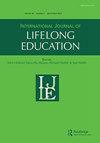Applying social marketing strategies in entrepreneurship training to turn unemployed adults into entrepreneurs in South Africa
IF 1.9
Q2 EDUCATION & EDUCATIONAL RESEARCH
引用次数: 0
Abstract
ABSTRACT The purpose of this article was to examine social marketing strategies Adult Education and Training (AET) centres in South Africa use during entrepreneurship training programmes. The sample was drawn from AET centres of the KwaZulu-Natal (KZN) province. The study used the qualitative approach (semi-structured interviews) to collect data from adult trainees and centre managers. However, the broader study upon which this article is based utilised mixed research methods, that is, quantitative and qualitative approaches. The main findings of the study reveal that the social marketing strategies that the AET centres apply to turn unemployed adults into entrepreneurs entails mobilising external stakeholders to create opportunities for trainees to access financial and non-financial support for the start-up and growth of micro-enterprises. The study tentatively concludes that social marketing strategies are effective tools AET centres can use to turn unemployed adults into entrepreneurs and facilitate socio-economic transformation in impoverished communities. As a practical implication for policy, there is need for policymakers at local and national levels to embrace social marketing to enhance the effectiveness of entrepreneurship training for poverty reduction among unemployed and vulnerable population groups.在创业培训中运用社会营销策略,使南非失业的成年人成为企业家
摘要本文的目的是研究南非成人教育和培训中心在创业培训计划中使用的社会营销策略。样本取自夸祖鲁-纳塔尔省的AET中心。该研究采用定性方法(半结构化访谈)从成年受训人员和中心管理人员那里收集数据。然而,本文所基于的更广泛的研究采用了混合的研究方法,即定量和定性方法。该研究的主要发现表明,AET中心为将失业成年人转变为企业家而采用的社会营销策略需要动员外部利益相关者,为受训人员创造机会,为微型企业的开办和发展提供财政和非财政支持。该研究初步得出结论,社会营销策略是AET中心可以用来将失业成年人转变为企业家并促进贫困社区社会经济转型的有效工具。作为政策的一个实际意义,地方和国家各级的决策者需要接受社会营销,以提高创业培训在失业和弱势群体中减贫的有效性。
本文章由计算机程序翻译,如有差异,请以英文原文为准。
求助全文
约1分钟内获得全文
求助全文
来源期刊

International Journal of Lifelong Education
EDUCATION & EDUCATIONAL RESEARCH-
CiteScore
3.10
自引率
27.80%
发文量
40
期刊介绍:
The International Journal of Lifelong Education provides a forum for debate on the principles and practice of lifelong, adult, continuing, recurrent and initial education and learning, whether in formal, institutional or informal settings. Common themes include social purpose in lifelong education, and sociological, policy and political studies of lifelong education. The journal recognises that research into lifelong learning needs to focus on the relationships between schooling, later learning, active citizenship and personal fulfilment, as well as the relationship between schooling, employability and economic development.
 求助内容:
求助内容: 应助结果提醒方式:
应助结果提醒方式:


